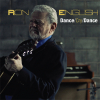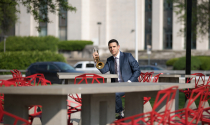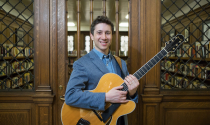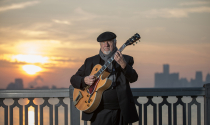Ron English - Dance/Cry/Dance
Biography
The record’s name perfectly reflects the character and progression of the music. Opening with “Dancers’ Serenade,” Dance/Cry/Dance establishes right out of the gate that this work is first and last about groove. Even so, along the way, English takes us on a curated ride that leads us through the emotional and spiritual side of groove, and then pulls us out the other side, still dancing.
“I don’t know that we always expect records to do that,” says English, who compares the record’s progression to the deliberate way a DJ programs music to achieve a malleable vibe, or the artful way many of the top entertainers with whom he’s played, such as the Four Tops, Martha Reeves and the Vandellas, or Mary Wilson, add contrast and surprise to their live performances, but always within the context of the overall progression of the show. “One thing leads to another, it’s not the same thing all the way through.”
Veteran fans of English know that his decades-long career spans a spectrum of musical styles, from the wide-open music of the expanded CJQ in the ’60s and the “asymmetrical” freedom of Synchron in the ’80s, to his organ trio work, and to his years playing in pit orchestras for the Fisher Theatre and others, backing Broadway musicals and pop acts. So where does Dance/Cry/Dance land between the poles of creative freedom and fixed structure?
“You have to sort of triangulate,” laughs English. “It’s in between. It’s a jazz record. It has a relationship to dance rhythms, out in groove territory, and it uses song forms, with what I like to think are fresh and appealing melodies. But the record also emphasizes the emotional development and storytelling and dialogue in the improvised solos, within the strength of the various grooves.”
Most of the compositions on Dance/Cry/Dance were written by English, including the previously recorded “Help Me Get Away,” which appeared on the 1973 cult-classic LP Saturday Night Special, by the Lyman Woodard Organization. As on the ’70s release, English is joined by drummer Leonard King (“that’s Dr. Professor Leonard King”). Here English gives it new life with a different tempo and a full horn section.
The record also features fellow DMF recording artist Glenn Tucker, who in addition to playing piano and organ on the CD also wrote “Donny-Rag,” a New Orleans-style dance tune that pays homage to the late Donny Hathaway. While the structure of “Donny-Rag” has multiple melodies, not unlike a ragtime song or Sousa march, it’s a solid New Orleans groove that features some harmonic devices that were used by Hathaway long ago.
The only cover on Dance/Cry/Dance is Jill Scott’s “Hear My Call.” Although English was drawn to the song in part for his admiration of Scott as a lyricist, the tune here is approached instrumentally, with English’s guitar replacing her voice. A very light percussion by Miguel Gutierrez beautifully shades the instrumental combination, and the surprising and haunting English horn adds a deeper, richer sound than the original’s string section.
English and his musicians are masterful in creating layers, and nowhere is this more beautifully orchestrated than “War in the Heavenlies.” The tune features Zen Zadravec on piano, Jaribu Shahid on bass, drummer Renell Gonsalves, Mark Kieme on flute, and Dwight Adams and John Douglas on trumpets.
On this cut, it’s the composition’s melody, and the richness of the bass line, which is doubled in the bass register of the piano and also on the guitar. Over the top of that, in the right hand of the piano, is a harmony that transforms the whole atmosphere with a chord that changes just one note at a time. Above this is a whole other melody that floats over the top. The mood and emotion produces an intense effect; it suggests, according to English, that down here in the mud and the blood and the beer, there’s a lot of activity in our daily lives, but up above there’s something else going on, it happens in the spirit, in an unseen world.
Perhaps one of the most surprising elements of Dance/Cry/Dance is that English goes to a lot of different places, which is not surprising given that in some ways the record has two different bands, at times featuring Tucker on piano or organ, and at times featuring Zadravec. The rhythmic emphasis is strong throughout, but there’s a variety of grooves. All of them, however, have an emotional quality in common: they make you want to dance.
Indeed, it is truth.
Albums by Ron English - Dance/Cry/Dance

Ron English - Dance/Cry/Dance
DMF2014
Now Playing:
You may also like

Anthony Stanco

Tbone Paxton & the RJ Spangler Quartet

Randy Napoleon

Dennis Coffey




